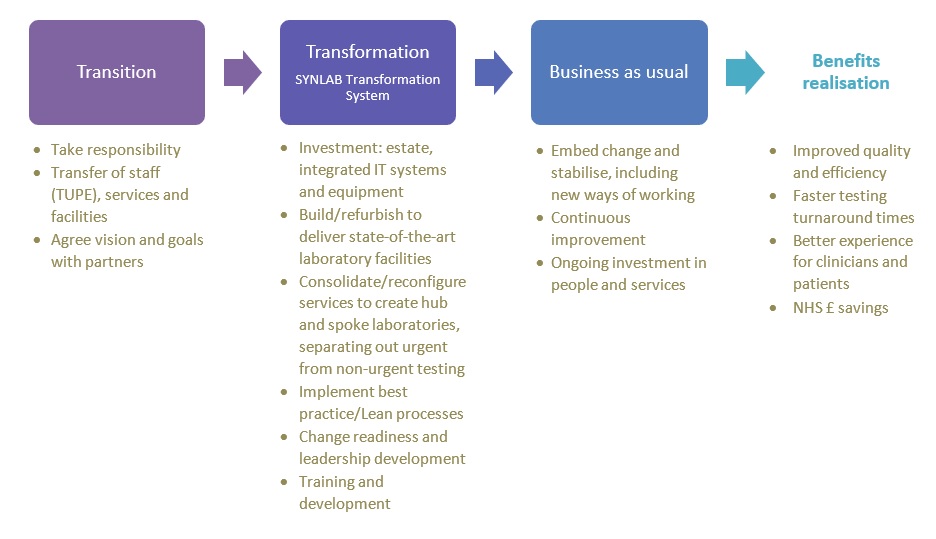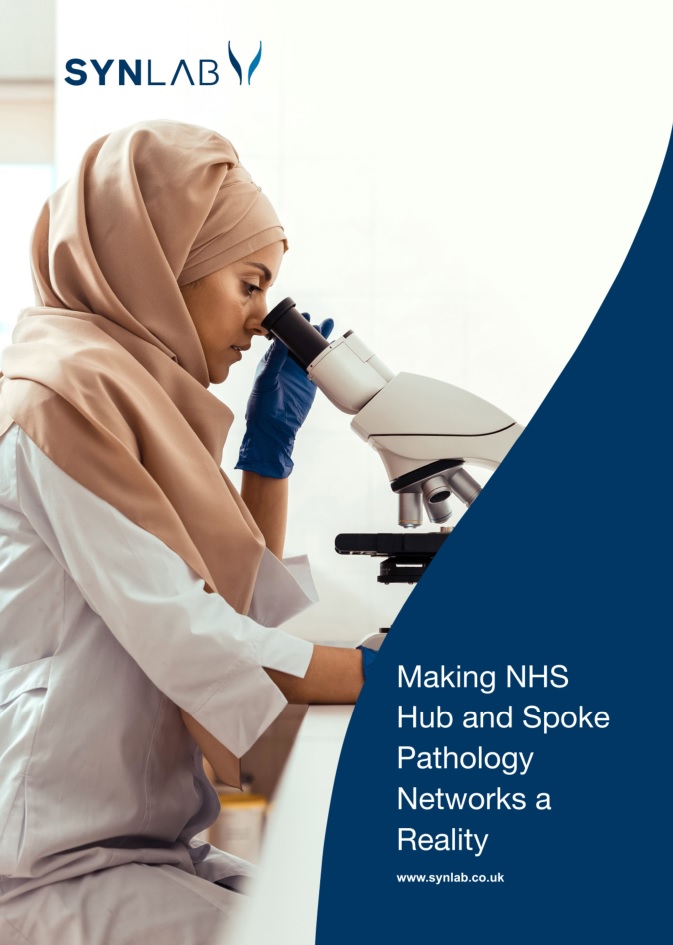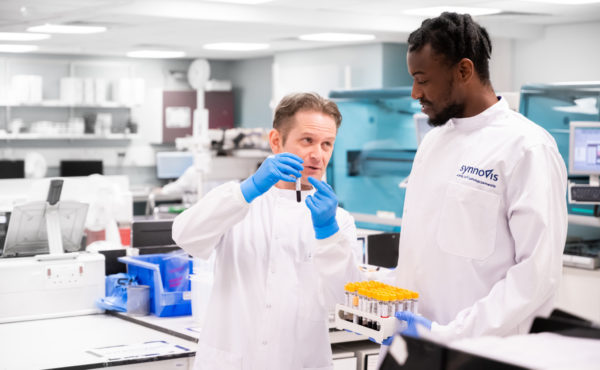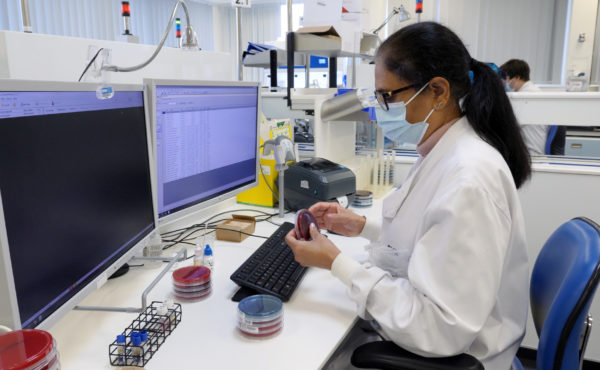Introducing NHS Hub and Spoke Pathology Services
Open BrochureIn 2017, the NHS proposed the creation of up to 29 ‘hub and spoke’ pathology networks across the country. These would see the consolidation, standardisation and transformation of existing pathology services to create new, joined up ways of working. The initiative aimed to save the NHS more than £200million by 2021 by improving the quality and efficiency of pathology testing services.
These networks are now considered key in delivering the national ambitions set out within the Long Term Plan for the NHS (2019).
In simple terms, a central ‘hub’ laboratory provides mostly non-urgent and specialist testing to a number of regional healthcare organisations. Where test results are needed urgently within 2 hours – for example by A&E departments or hospital wards – smaller on-site ‘Essential Services Laboratories’ (the spokes) focus on turning around urgent tests as quickly as possible. SYNLAB’s work has demonstrated that, by separating these two key areas, major improvements can be made to patient care and experience.
SYNLAB – Turning NHS Vision Into Reality
At SYNLAB, we have successfully designed and implemented hub and spoke pathology networks and, in so doing, have proven the theory behind the hub and spoke model. We have two well-established hub and spoke NHS partnerships: Pathology First and Southwest Pathology Services. In each, we have demonstrated our ability to consolidate and transform existing pathology services to create an effective regional hub and spoke pathology network.
Our hub and spoke pathology partnerships exemplify how SYNLAB is helping to turn the NHS vision into reality. By combining NHS clinical excellence with the very best in industry innovation, transformation and technology, we have delivered major benefits for patients, clinicians and the NHS. More about these can be found here.
Importantly, these benefits are not limited to our immediate NHS partners. Our networks are structured flexibly to allow other local healthcare providers to participate. By involving neighbouring hospitals, community services, GP practices and independent providers, network benefits can be extended and shared more widely across the healthcare system.
Led by the NHS
Our partnership model ensures that pathology services remain clinically led by the NHS, whilst responsibility for transformation and day-to-day delivery is transferred to SYNLAB.
Our governance structures are carefully designed to ensure the NHS continues to take a lead role in setting the strategic direction of pathology services. This means the development of pathology.
SYNLAB’s Role in NHS Partnerships
At SYNLAB, we…
- Provide the investment, resources and expertise required to consolidate and transform pathology services, embedding the hub and spoke network
- Build and refurbish laboratories, providing the NHS with bespoke, state-of-the-art facilities and equipment
- Take responsibility for the day-to-day running of pathology testing services
- Employ and develop the laboratory teams
- Install integrated IT systems to link hub and spoke laboratories and referral sites
- Implement international best practice and better ways of working to improve efficiency and deliver better value for money
- Develop safe, high quality laboratory services, which are fully compliant with industry standards and accredited by the United Kingdom Accreditation Service (UKAS)
- Work with NHS partners to engage with key stakeholder groups, including NHS staff, regulators, clinicians, commissioners, GPs, hospital boards, Clinical Commissioning Groups and other influential local opinion formers and policy makers
- Share learning and best practice within the local NHS and across our other NHS hospital partnerships
- Deliver tangible benefits for patients, clinicians and the NHS
The SYNLAB Transformation System ©
Consolidating and transforming pathology services into hub-and-spoke networks is highly complex and challenging but we have demonstrated our ability to do so successfully in partnership with the NHS.
We have developed our own bespoke improvement methodology – the SYNLAB Transformation System©. This combines PRINCE2 and Lean principles, with organisational development and change methodologies which focus on behaviour and leadership. We use this proven approach to plan and mobilise major network transformation and laboratory redesign initiatives.
This video tells the story of how we applied the SYNLAB Transformation System within our Essex-based NHS partnership, Pathology First.
SYNLAB’s Approach to Transformation

The SYNLAB Approach
On day one, responsibility for delivering and transforming services is handed over to SYNLAB. This includes the transfer of pathology staff, services, facilities, equipment and contracts. We finalise and agree a shared vision for pathology services with NHS partners, involving staff, clinicians and other stakeholders. We then work closely with NHS clinicians, pathology staff and others to develop the future arrangements for laboratory services, ensuring that they will meet requirements.
To create a hub and spoke model, we start by building a central, state-of-the-art pathology ‘hub’. From this hub, we provide mostly high-volume, non-urgent pathology testing as well as some specialist testing services. These testing services are consolidated and harmonised within the hub to improve laboratory effectiveness and efficiency.
The next step is to reconfigure and refurbish existing hospital-based services to become ‘Essential Services Laboratories’ (the ‘spokes’). Also run by SYNLAB, these focus on delivering pathology testing and diagnostics for inpatients and urgent cases, e.g. for Accident and Emergency patients. Because these spoke laboratories need less room to operate, we are able to free up valuable floorspace the NHS can use for other services.
We invest in integrated IT systems across the hub and spoke laboratories, optimise workspace layouts, and implement best practice, standardised processes to improve ways of working and increase efficiency.
As a result of configuring services into a hub and spoke model results, urgent pathology tests are separated out from routine, ‘non-urgent’ testing. At SYNLAB, we have proven this approach to be a key factor in improving efficiency and reducing cost. One of the key benefits we deliver – faster testing turnaround times – is discussed within the following papers:
James (2016). The Benefits of Joining a Joint Venture for Pathology, Health Service Journal
Digital Pathology Imaging
As well as investing in modern laboratory IT systems, we have also introduced digital pathology imaging, which can be accessed remotely. This speeds up diagnosis and enables clinicians and other specialists to collaborate more effectively.
Quality
All our laboratories are underpinned by a robust Quality Management System. They are CQC-registered, UKAS accredited, comply with MHRA guidelines and support licensing by the HTA where appropriate. The partnership governance structure supports the provision of end-to-end pathology services in accordance with ISO 15189 Medical Laboratories – requirements for quality and competence.




